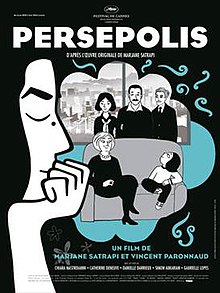Persepolis (film)
| Persepolis | |
|---|---|

Theatrical release poster
|
|
| Directed by | |
| Produced by |
|
| Screenplay by |
|
| Based on |
Persepolis by Marjane Satrapi |
| Starring | |
| Music by | Olivier Bernet |
| Edited by | Stéphane Roche |
|
Production
companies |
|
| Distributed by | Diaphana Distribution (France), Sony Pictures Classics (USA) |
|
Release date
|
|
|
Running time
|
96 minutes |
| Country | France |
| Language |
|
| Budget | $7.3 million |
| Box office | $22.8 million |
Persepolis is a 2007 French animated biographical film based on Marjane Satrapi's autobiographical graphic novel of the same name. The film was written and directed by Satrapi with Vincent Paronnaud. The story follows a young girl as she comes of age against the backdrop of the Iranian Revolution. The title is a reference to the historic city of Persepolis.
The film was co-winner of the Jury Prize at the 2007 Cannes Film Festival and was released in France and Belgium on 27 June. In her acceptance speech, Satrapi said "Although this film is universal, I wish to dedicate the prize to all Iranians." The film was also nominated for the Academy Award for Best Animated Feature, but lost to Ratatouille.
At the airport, Marjane is unable to board a plane to Iran. She then takes a seat and smokes a cigarette. She reflects on her childhood, full of politically driven conflict. As a young girl, Marji lived in Tehran and wanted to be a prophet and a disciple of Bruce Lee. Her childhood ambition is the general uprising against the Shah of Iran. Her middle-class family participates in all the rallies and protests. Marji and a group of friends attempt to attack a young boy named Ramen, whose father, a member of SAVAK, killed Communists for no particular reason. One day, Marji's Uncle Anoush arrives to have dinner with the family after recently being released from his nine-year sentence in prison. Uncle Anoush inspires Marji with his stories of his life on the run from the government, a result of rebelling. Political enemies cease fighting and elections for a new leading power commence. Marji's family's situation does not improve as they are profoundly upset when Islamic Fundamentalists win the elections with 99.99% of the vote and start repressing Iranian society. The government forces women to dress modestly, including wearing a head scarf, and Anoush is rearrested and executed for his political beliefs. Profoundly disillusioned, Marji tries, with her family, to fit into the reality of the intolerant regime. The Iran-Iraq war breaks out and Marji sees for herself the horrors of death and destruction. The Iranian government begins implementing ridiculous laws that create blatant injustices. Marji witnesses her father threatened by rifle-wielding teenaged government officials and watches her critically ill uncle die after an unqualified government-appointed hospital administrator refuses to allow him to travel abroad for medical treatment. The family tries to find solace in secret parties where they enjoy simple pleasures the government has outlawed, including alcohol. As she grows up, Marji begins a life of over-confidence. She refuses to stay out of trouble, secretly buying Western heavy metal music, notably Iron Maiden, on the black market, wearing unorthodox clothing such as a denim jacket, celebrating punk rock and other Western music sensations like Michael Jackson, and openly rebuts a teacher's lies about the abuses of the government.
...
Wikipedia
